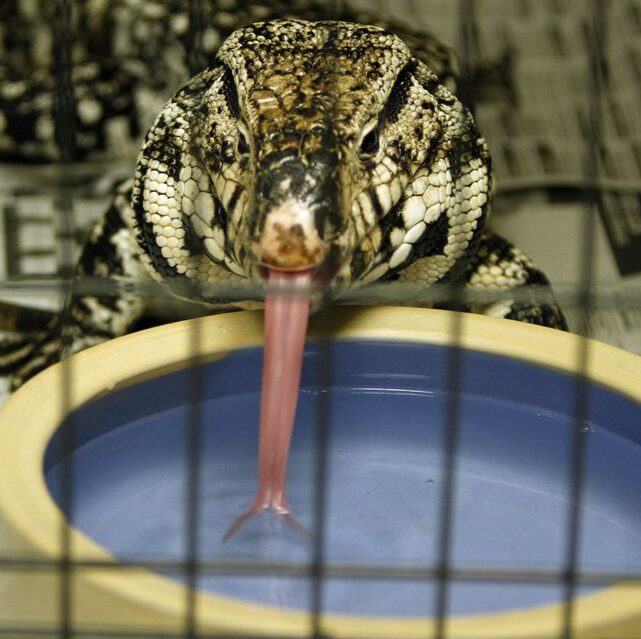Florida is restricting the possession and private breeding of certain exotic animals, including Burmese pythons, green iguanas and tegu lizards, citing concerns about invasive species overrunning the state. The move comes in the face of fervent opposition from reptile enthusiasts and dealers.
“The environment trumps the livelihood on this one, unfortunately,” said Rodney Barreto, chairman of the Florida Fish and Wildlife Conservation Commission. He and fellow members voted unanimously Thursday to support the policies. “It’s not an easy decision, but it’s one we need to make.”
The rules will prohibit people from owning as pets or breeding for commercial sale animals including: the Nile monitor lizard, Burmese python, Northern African python, reticulated python, tegu lizards, green iguanas, Southern African python, amethystine python or scrub python. Some, like the iguana and Burmese python, are well established and breeding in Florida. Others, like reticulated pythons that can grow to more than 20 feet, are not, but state wildlife regulators say they want to head off problems before they occur. They worry about escaped and released animals starting or growing wild populations.
“These animals are out there doing lots of damage,” said Commissioner Robert Spottswood.
People who have iguanas and tegus will not need to immediately turn them in or kill them. Owners can keep currently legal pets until they die. Some breeders will be allowed to import and possess species in the future, under specific conditions, for limited uses such as exhibitions or research. They will also be able to capture wild tegus and iguanas to sell or send out of state, according to a state presentation, and the prohibition on breeding those lizards for commercial sales will not start until 2024.
Critics on Thursday tried to dissuade the commissioners, describing their personal attachment to reptiles. People misunderstand snakes and lizards, they said, comparing their chosen pets to dogs and cats. Several callers tuned in to the meeting from out of state.
“People who own reptiles have a mental and emotional connection to them,” said Nicole Tisdale, who said she has reptiles, lives in Maryland and has reconsidered moving to Florida because of the new rules. “They are a part of our family, they are a part of our being.”
Before the vote, Melissa Tucker, who directs the commission’s Division of Habitat and Species Conservation, described the problems invasive reptiles cause in Florida. She said the warm climate is beneficial to animals that do not belong here and that displace or kill native wildlife.
Tegus, for instance, are a troublesome lizard in several regions, including Hillsborough County, and are known to eat alligator eggs and vie with gopher tortoises for burrows. Green iguanas undermine roads with their digging in South Florida and eat up homeowners’ plants.
The reptile trade may be worth as much as $200 million annually in Florida, according to Tucker, but the species affected by the rule are one part of a market that includes thousands of animals. She said regulators know of about 120 license holders statewide who have inventories of tegus or iguanas and a few dozen dealers who sell reptiles such as the listed snakes.
The Fish and Wildlife Conservation Commission spends more than $8 million a year to manage invasive species, Tucker said, including almost $1 million on the Argentine black and white tegu.
Critics questioned the accuracy of the agency’s financial assessments and accused Tucker of “sensationalizing.” Cutting into the wildlife trade, especially key lizards such as tegus and iguanas, they said, will touch related operations, including food suppliers and shipping companies.


